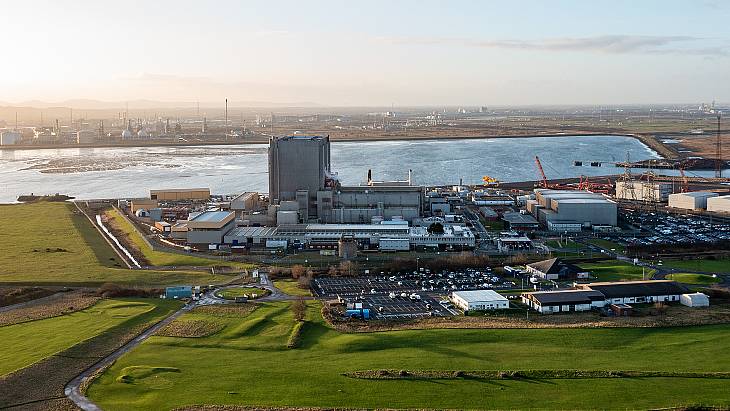X-energy and Cavendish Nuclear have commissioned Teesside University to undertake a study of the potential regional benefits and economic impacts of a proposed power plant in Hartlepool, UK, based on X-energy's Xe-100 high temperature gas-cooled reactor.

Hartlepool is now due to operate until 2026 (Image: EDF)
The assessment - including jobs, skills, supply chain contracts, and investment - will be led by Matthew Cotton, Professor of Public Policy and will utilise expertise from Teesside University International Business School and its School of Social Sciences, Humanities & Law. It will include a review of available socio-economic data and engagement with local stakeholders including government officials, community leaders and sector experts.
The study will also examine national impacts, including contributions to meeting the UK government's net-zero targets. This assessment - which will begin immediately and be completed later this year - will include the additional benefits from industrial decarbonisation applications and the manufacture of other clean energy products, such as hydrogen and aviation fuel.
According to X-energy and Cavendish, early estimates indicate a 12-reactor X-energy plant at Hartlepool would "directly employ hundreds of people in operations and a peak construction workforce of several thousand in addition to the employment benefits in the wider supply chain".
The study is part of a GBP6.68 million (USD8.5 million) programme funded by X-energy, and by the UK government which awarded the firms GBP3.34 million in April this year from the Department of Energy Security and Net Zero's Future Nuclear Enabling Fund.
The Xe-100 is a Generation IV advanced reactor design which X-energy says is based on decades of HTGR operation, research, and development. Designed to operate as a standard 320 MWe four-pack power plant or scaled in units of 80 MWe, it is engineered to deliver reliable and load-following grid-scale power to electricity systems and to pair seamlessly with renewables. At 200 MWt of 565°C steam, the Xe-100 is also suitable for other power applications including mining and heavy industry.
X-energy and Cavendish - a wholly-owned subsidiary of Babcock International - are proposing to develop a 12-reactor plant at the Hartlepool site on Teesside in the northeast of England, to be operational by the early 2030s. The companies plan to build a fleet of up to 40 Xe-100 reactors in the UK.
Carol Tansley, X-energy's vice president of projects and UK market leader, added: "Our nuclear power station project represents a fantastic economic and employment opportunity in addition to the vital contribution it makes to energy security and decarbonisation. We want to understand from the outset how best to help our potential host community and the surrounding area capitalise on the benefits it will bring.
"Teesside University is ideally placed to help us. The team has huge experience of similar exercises in the past, and excellent links with the local community and business sector."
Cavendish Nuclear Managing Director Mick Gornall added: "A regional economy which hosts a project like this can experience a rise in productivity and growth. Creating supply chains and other infrastructure in local and neighbouring areas can permanently enhance economic capacity. Beyond Hartlepool, we estimate a national fleet roll out of 40 Xe-100s could bring around GBP20 billion of investment into the UK."
Teesside University's Professor Cotton said: “A core principle of our research is to work with communities to address regional disparities and drive social impact for regions across the world. The proposed nuclear power plant at Hartlepool represents a massive capital investment in the Tees Valley and it is vital to understand what that impact will look like.
"By analysing how a project of this scope and scale will manifest itself, we will be able to determine the different socio-economic considerations, issues and risk factors for Hartlepool and surrounding regions.
"In doing so, we will be able to determine the best course of action in order to take full advantage of the benefits and mitigate any impacts for the region."
The Hartlepool nuclear power plant, on Teesside in the northeast of England, is among four of the UK's seven AGR fleet which continue to generate electricity. It has been operating for 40 years and was due to end operations in March this year until a two-year extension was announced in March last year.